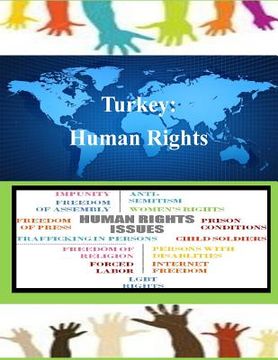Reseña del libro "Turkey: Human Rights (en Inglés)"
Turkey is a constitutional republic with a multiparty parliamentary system and a president with limited powers. A unicameral parliament (the Grand National Assembly) exercises legislative authority. Following the 2011 parliamentary elections, which observers considered generally free and fair, the Justice and Development Party (AKP) formed a parliamentary majority under Prime Minister Recep Tayyip Erdogan. Civilian authorities maintained effective control of the security forces, but some elements of the security forces committed human rights abuses. The most significant human rights problems during the year were: Government interference with freedom of expression and assembly: The penal code and antiterror law retain multiple articles that restrict freedom of expression, the press, and the internet. Authorities imprisoned scores of journalists who remained incarcerated at year's end, most charged under the antiterror law or for connections to an illegal organization. Self-censorship was common because individuals feared that criticizing the state or government publicly could result in civil or criminal suits or investigations. The government harassed and prosecuted persons sympathetic to some religious, political, and Kurdish nationalist or cultural viewpoints. Authorities used excessive force to disperse protests, detained thousands of persons, including many journalists, academics, lawyers, and students, during demonstrations, and charged many under the antiterror law. Of particular note, authorities used excessive force in response to the summer's Gezi Park protests, leading to mass casualties (including seven deaths) and an overall diminution of freedom of expression and press. Law enforcement and administration of justice: Broad laws against terrorism and other threats to the state and a lack of transparency in the prosecution of such cases restricted access to justice. The judicial system was politicized and overburdened. Authorities continued to engage in arbitrary arrests, hold detainees for lengthy and indefinite periods in pretrial detention, and conduct extended trials. Orders for the secrecy of investigations limited defense access to evidence and fueled concerns about the effectiveness of judicial protections for suspects. The close connection between prosecutors and judges gave the appearance of impropriety and bias. The broad authority granted to prosecutors and judges contributed to inconsistent and uncertain application of criminal laws, particularly during expansive investigations related to state security. Of particular note, law enforcement and the judiciary were subject to executive branch influence as the government reassigned thousands of police and prosecutors during the December 17 anti-corruption operation and subsequent scandal. Inadequate protection of vulnerable populations: The government did not effectively protect vulnerable populations, including women, children, and lesbian, gay, bisexual, and transgender (LGBT) individuals, from societal abuse, discrimination, and violence. Violence against women, including so-called honor killings, remained a significant problem, and child marriage persisted. Other human rights problems during the year included: Security forces' allegedly unlawful killings; allegations of torture and use of excessive force by law enforcement officials; overcrowding and other shortcomings in prisons; restrictions and abuses of religious freedom such as for religious minorities; corruption, and government restrictions on human rights organizations, particularly in the southeast. Impunity remained a problem. The government investigated reports of abuse by security forces as well as reports of corruption in other parts of the government, but the number of arrests and prosecutions was low, and convictions remained rare.

